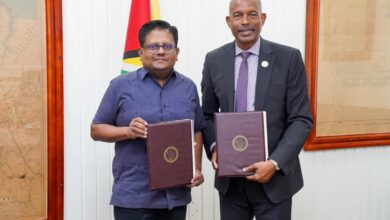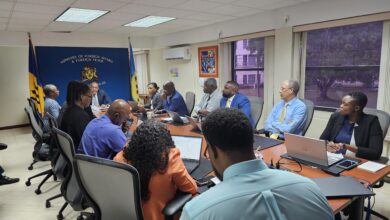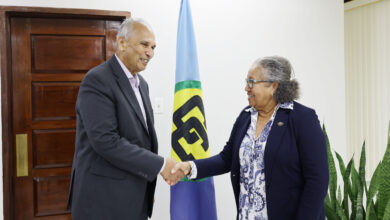Chairperson, Honourable Suresh Algoe Minister of Agriculture, Animal Husbandry Fisheries, Chairperson of the Local Organizing Committee and Members of said Committee, President of the Caribbean Food Crop Society, Representatives of the University of Suriname, University of the West Indies, the Inter American Institute for Cooperation on Agriculture, University of Puerto Rico, the Food and Agriculture Organization, CACHE and other distinguished partners in sustainable agricultural development, Ladies and Gentlemen, Good Morning and best wishes for a successful 51st meeting of CFCS.
Providentially, my 35 years of association with the CFCS in assorted capacities coupled with my recent instalment as the Executive Director of CARDI imbues me with a sense of honour to be afforded the privilege of addressing you this morning and share a few thoughts on CARDI. However, more importantly, I could not deny myself the opportunity of allay withdrawal symptoms associated with previous sojourns in Suriname and renew acquaintances with Suriname and the richness it has to offer the Caribbean and I therefore complement the Government and People of Suriname and CFCS for hosting this convocation.
The United Nations Department of Economic and Social Division, projects the Caribbean population to be 45.8 million by 20501.
This coupled with growing hunger and poverty rates, changes in consumption patterns, climate change, ageing farmers, declining productivity and the accelerated depletion of natural resources means that the role of agriculture and by extension Caribbean agriculture to contribute to food and
nutrition security and economic opportunities in an environmentally sustainable manner is more critical than ever before. Arguably, in recognition of the aforementioned reality embedded in which is tremendous opportunity, we must recognise the wisdom of the Strategic Plan for the Caribbean Community 2015 – 2019: Repositioning CARICOM which embraces the role of agriculture as one of the key drivers of economic development in the Caribbean. The challenges and opportunities were accentuated during the High Level Dialogue with the theme: CARICOM – Vibrant Societies, Resilient
Economies: A partnership for Implementation, that was held as part of the 36th Regular Meeting of the Conference of Heads of Government of the Caribbean Community that was convened in Barbados July 2-4, 2015. In delivering his address to the Conference, the Right Honourable Freundel Stuart, Prime Minister of Barbados made pointed United Nations (2004). World Population to 2300. Available online http://www.un.org/esa/population/publications/longrange2/WorldPop2300final.pdf reference to the paramountcy of realising the vaunted vision of utilizing the resources of Suriname, Guyana and Belize to assist in feeding the Caribbean, in other words moving from talk to action.
In this context therefore, it is pellucidly clear that CARDI has a pivotal role to play in realizing the sustainable development vision for the Caribbean, and this is the challenge about which I speak. In recognition of its mandate “Improving Lives Through Agricultural Research and Development”, and consequent upon the contextual framework, CARDI’s immediate future will be predicated on scientific, technological, human capital and governance innovations, forging and fostering symbiotic and commensal partnerships with both the public and private sectors, academia and civil society to
encourage investment and development in a competitive and sustainable regional agricultural sector, in other words the future we want.
Agricultural research and technological improvements are and will continue to be prerequisites for increasing agricultural productivity, expanding production, generating improved and reliable income for farmers, whist at the same time protecting the environment and this requires continued investment. The sustainability of the agriculture sector now more than ever demands and depends on innovation. CARDI will emphasize research and development systems that result in innovations that lead to the development of novel products, services and management practices which will enhance
the agricultural productivity and efficiency across the value chains of targeted commodities. For example, in our hot pepper seed production programme, CARDI will be moving towards the development of hybrids rather than open – pollinated varieties.
The development and maintenance of Intellectual Property Rights is an essential basis for innovation and it is one that CARDI will be actively pursuing. CARDI’s core budget has not been increased since 1986, so for us to continue to make a meaningful contribution to the sector it is essential that multi-pronged, sustainable financing mechanisms enshrined in accountability and delivering value for money be enacted as quickly as possible. Both public and private funds for research and development are desirable but scarce and we need to encourage continuous investment especially from
the private sector in agricultural research, we submit that intellectual property development and protection will aid in this. CARDI is hopeful that many of these innovations will move to commercial use; and this will greatly assist in putting the Institute on a more sustainable financial pathway.
It is clear that for the Regional agriculture sector to become sustainably competitive all stakeholders must be in contact with and have confidence in systems that harness their collective intellectual capacities and resources. We have to work together to avoid incest, duplication and duplicity. I give you my personal commitment that CARDI will be proactive in seeking out partnerships with the private sector, universities, governments and other research institutions at the national, regional and international levels. This approach ensures that agricultural research programs are maintained and strengthened in the face of waning public investments. In this regard, I view CFCS as an important vehicle for encouraging young scientist, networking with peers, sharing and benefiting, and therefore a Caribbean partnership which CARDI pledges to continue to support. We will either go forward in harmony or become faint memories on the sands of times.
We fully realise that private sector investment is one of the critical success factors for the future we want in the Caribbean. We accept that institutions like CARDI whether national regional or international do not invest in production and trade but rather contribute to creating appropriate investment climates. Furthermore, we are aware that agricultural research and development in the Caribbean generally produces public goods. However, I submit that part of the strategy to avoid the threat of institutional redundancy, agricultural research and development institutes must identify and implement mechanisms to meaningfully engage the private sector. Mutual benefits will be derived from this relationship once properly structured. In Jamaica, the Institute has been working with Diageo the parent company of Red Stripe Beer to improve productivity levels for cassava under their “Project Grow Initiative”. The CARDI Unit has provided technical support to the establishment of the 14 hectares of cassava under the initial phase of the project. The plan is to cultivate 200 ha of cassava over the next two years and 1000 ha within five years. Diageo aims to replace 20 per cent of imported
inputs, primarily barley with starch obtained from cassava. This project must define and test technology packages and systems that produce 40 to 60 tonnes per hectare, which is comparative to that which is produced in Africa, Brazil and the Philippines. Cassava farms in Jamaica currently yield between 10-15 tonnes per hectare. CARDI is hopeful to duplicate such efforts with other private entities and other commodities.
The Region must foster a climate for investment. We have an excellent model with Guyana, where the government there has opened up agricultural lands to large scale private investors from Barbados and Trinidad and Tobago of which there are about seven. 400 ha have been allocated to the Trinidad and Tobago Citrus Growers Association of which 75 ha are currently under cultivation2
. These ventures will help to reduce the food import bill of both countries as well as contribute to food and nutrition security. It is cross border models like these we should be advocating for in the Region.
We must, however, at the same time encourage small scale and family farmers as they too have an important role to play in not just feeding themselves but their communities and rural development. For small scale farmers to graduate out of the subsistence realm, policies must be put in place to help move them to higher-risk/higher-return activities through insurance programmes, input subsidies, attention to good agricultural practices, addressing food safety etc. Farmers organisations must be empowered, they must be trained in new technologies and have access to improve financing.
As the Region continues to grapple with an aging farming population, policies should also be focused on the engagement and retention of youth into the sector. CARDI has already begun the process of empowering the young people in the organisation through opportunity, mentorship and leadership and will be relying on partners such as the University of the West Indies and CFCS for furtherance of its youth agenda.
The role and function of CARDI is more relevant than ever before. We will continue to promote and demonstrate the need for investments, partnerships and engagement of stakeholders as being essential pre-requisites for economic growth and the attainment of food and nutrition security attainment in the Region.
Ministry of Agriculture (2014). Trinidad investors scoping Guyana Agricultural lands; local Farmers shouldn’t be worried. Available online http://agriculture.gov.gy/trinidad-investors-scoping-guyana-agricultural-lands-localfarmers-shouldnt-be-worried/
I reiterate my appreciation to the CFCS and the Government and People of Suriname and wish you a successful meeting. Thank you…






